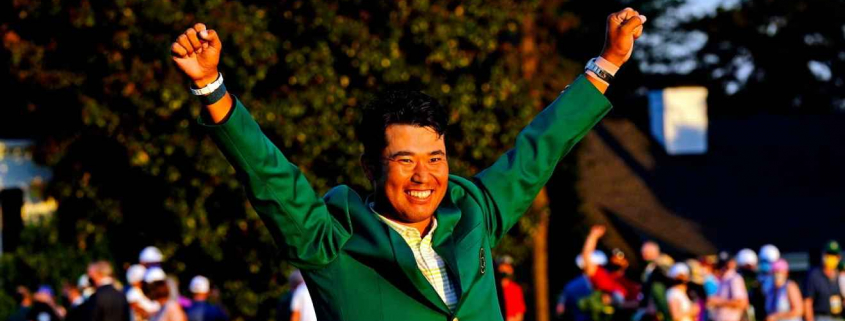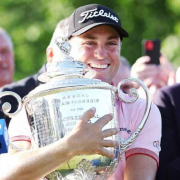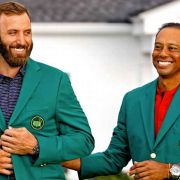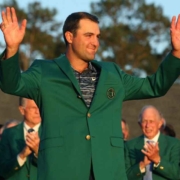All The Big Lessons This Masters Taught Us
The Masters came upon us quickly in 2021, with the previous installment having just ended only five months earlier and without another major championship between them. Dustin Johnson’s time with the green jacket was short, and Hideki Matsuyama lifted up a nation in winning this one.
Here are things we learned over the course of another week at Augusta National.
1. Firmer, faster is better
For the first time in several years, Augusta National offered up the kind of conditions that are favored for major championships. The fairways were running fast, the greens were firm and quick. Both gave the players fits.
While it is fair to say that the greens might have bordered on the edge during the opening round on Thursday, the resulting difficulty led to a far more compelling tournament. Players were on edge, and that’s part of the examination in a major.
Just when it appeared Matsuyama had the tournament firmly in his grasp, he blasted his approach over the green and into the water at the par-5 15th. That would not have happened at the very soft Masters in November. He also made bogey at the 16th, three-putting the green from long distance.
Each day offered an opportunity for someone to shoot a low score. Justin Rose had 65 on Thursday. Matsuyama matched that on Saturday. On Sunday, Jon Rahm, too far back to contend, posted 66. Such conditions require an abundance of precision in order to prevail.
2. More roars, more needed
It was nice to have spectators back at Augusta National after only a smattering of members and guests were allowed in November. At times, there were large pockets of masked gatherings throughout the property. You could hear the cheering at Amen Corner from the clubhouse. Just not enough of it. And not loud enough.
Part of the Masters’ allure is the packed grandstands — there were no structures again, just like in November — as well as rows deep of patrons trying to get a glimpse of the action. The pandemic circumstances necessitated the limited attendance. The hope is it’ll be back to normal in 2022.
3. As the game grows around the world
The Masters and Augusta National are understandably proud of their efforts to grow the game around the world with two amateur events, including the Asia-Pacific Amateur, which began in 2009. Matsuyama won the tournament twice as an amateur, thereby earning a spot in the Masters, which he played for the first time 10 years ago. On Sunday, he became the seventh player to win low-amateur honors at the tournament and go on to win the green jacket. The Masters folks will use his win as a way to help encourage players in Asia and in Latin America — where the Latin America Amateur Championship is played — to take up the game and dream of Matsuyama’s exploits.
4. DeChambeau’s mental work
When Bryson DeChambeau said last fall that he thought Augusta National would play to a par of 67 for him, he clearly did not expect to be finishing in a tie for 46th. He had tied for 34th in the fall. DeChambeau seemed to get on track with a second-round 67, but he opened with 76 and then added 75 and 75 on Saturday and Sunday. His length might be an asset, but he needs a lot more to get competitive here.
“I don’t think you can ever figure this place out,” he said. “There’s so many things going on around here. The wind makes it diabolical. It’s flying around through these trees and bouncing off the trees and making it feel into the wind when it should be downwind, and vice versa. I don’t think you’ll ever be able to figure it out, but I’ve just got to be more comfortable.”
5. Spieth is back
We already knew this. But a strong performance that he even said was far from his best was another indication of the progress Jordan Spieth has made this year. A week after winning the Valero Texas Open, Spieth tied for third at the Masters despite never really being able to keep much momentum going and having a triple bogey on Thursday.
“I wish that I had the control of my swing that I hope is coming or I think is coming soon because it would have made things a little easier this week, and I did strike the ball really well,” said Spieth, who led the field in greens in regulation with 56 out of 72. “I hit a lot of fairways. I put myself in position to hit a lot of greens, and distance control is a strength of mine with iron play. I did a good job of that.
“So all in all, I’ve made a lot of good progress, but I feel like that road ahead is still significant for me. So I’ve got at least a couple weeks off right now where I’ll rest for a while and then regroup and see if I can get — off weeks are where you can make maybe 5% differences.”
6. Schauffele has more lessons to learn
Xander Schauffele said as much after tying for second at the 2019 Masters, a stroke behind Tiger Woods. Undoubtedly it was the same Sunday as he somehow hit it in the water at the 16th hole after making things interesting with four consecutive birdies.
“It’s another lesson to put in the memory bank,” he said. “[In] 2019, I had a rookie hiccup moment of, ‘Oh my goodness, I’m leading the Masters.’ This year I was chasing. I’m playing better than I was in 2019, and I made a mistake on shot selection and wind.”
The triple-bogey 6 was the first triple Schauffele has ever made in any major championship round.
7. Koepka needs more time to heal
You have to give Brooks Koepka credit for making an effort to play the Masters just three weeks after knee surgery. But it never seemed like a good idea. The way he walked around one of the most undulating courses showed the strain he put on his right knee. Koepka missed the cut, and will now likely be off for several weeks to make sure the knee gets better. He probably would have been better off skipping this event, something that is easy to see now.
8. A Rory reset is needed
The thought here had been that Rory McIlroy was not that far off. That bringing in Pete Cowen to help him before the Masters might be a quick fix to help straighten out his game, and that the lower expectations might mean an easy path to contention at the only major he has failed to win. Nope.
McIlroy struggled again and has now missed the cut at the Players Championship and the Masters. It was a disappointing showing for one of the game’s most popular players. It will be interesting to see if he can find his form in time for the PGA Championship next month at Kiawah, where he won the tournament in 2012.
9. Zalatoris doesn’t have status
Consider this: Despite tying for sixth at the U.S. Open and finishing second at the Masters, Will Zalatoris is not a member of the PGA Tour. He is a special temporary member due to his success over the past six months and is assured of earning his PGA Tour card for the 2021-22 season. But as it stands, he is not eligible for the FedEx Cup playoffs. You need to be a full member of the PGA Tour for that. Right now, the only way to accomplish that is by winning a tournament. Given his recent form, that appears inevitable.
10. The Masters always delivers
Well, we didn’t really learn that. It has seemingly always been the case. But Zalatoris summed it up nicely and referenced Tiger Woods in the process.
“Everybody watches. Everybody remembers,” he said. “I was laughing with my parents [Saturday] night talking about how I could give you a memory of every single hole. I mentioned that I’ve seen guys for years when the pin is back left on 10, guys missing that putt low. Examples like that.
“But I think has a lot to do with Tiger, a lot of kids getting into the game and a lot of kids watching his success here — especially he won in ’97 and he won in 2019. He’s our trendsetter for the game. I think that’s part of the reason why so many kids come out early, is we saw him be fearless at a young age. So we come out and play fearless. And then on top of that, we were interested in watching the tournament year in, year out.
“And I think that’s something the Masters does so incredibly well is you can watch every single shot of every single player. Even [Sunday] morning I’m sitting around watching guys play the golf course to see how holes are playing. But I think a lot of that has to do with Tiger.”
Bob Harig ESPN Senior Writer








